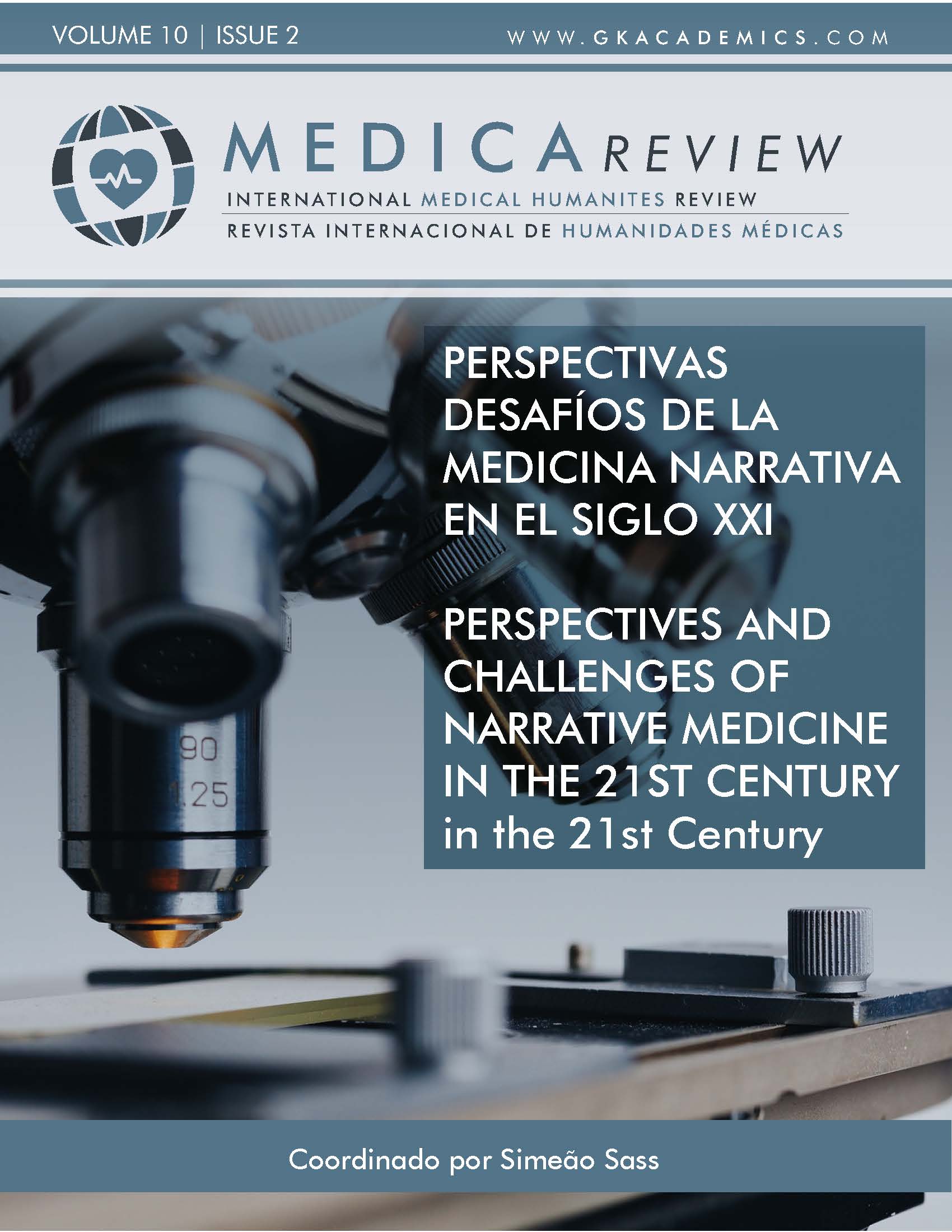Narrative Medicine: Principles, Benefits and Challenges
DOI:
https://doi.org/10.37467/revmedica.v10.3281Keywords:
Narrative Medicine , Narrativity, Medical Humanities, Health Humanities , Empathy, Patient centered-medicineAbstract
Narratives are a fundamental part of human lived experiences and disclose values, meanings, and purposes. Narrative Medicine emerged from the urgent call to react to the radicalization of biomedical model in healthcare, that promoted significant advances in medicine but, at the same time, moved away subjectivity from medical-patient relationship. Narrative competence is understood as the capability to listen, absorb, interpret, and take decisions based on patients’ accounts and that competence involves textual, creative, and affective abilities when listening or reading stories. The goal of this article is to discuss the history, principles, practice, and challenges of narrative medicine.
References
Ahlzén, R. (2019). Narrativity and medicine: some critical reflections. Philosophy, Ethics, and Humanities in Medicine, 14(9), 1-10. https://doi.org/10.1186/s13010-019-0078-3 DOI: https://doi.org/10.1186/s13010-019-0078-3
Andersen, F.A., Johansen, A.S.B., Soondergaard, J., Andersen, C.M., & Hvidt, E.A. (2020). Revisiting the trajectory of medical student’s empathy, and impact of gender, specialty, and nationality: a systematic review. BMC Medical Education, 20(52), 1-18. https://bit.ly/3Tr8sYU DOI: https://doi.org/10.1186/s12909-020-1964-5
Arntfield, S. L., Slesar, C., Dickson J., & Charon R. (2013). Narrative medicine as a means of training medical students toward residency competencies. Patient, Education and Counseling, 91(3), 280–286. https://doi:10.1016/j.pec.2013.01.014. DOI: https://doi.org/10.1016/j.pec.2013.01.014
Casapulla, S., L., Bianco, J., A., Harter, L., M., Kropf, K., Shaub, T. L., Kerr. A., M., Blais, F., X., Newburn,R., Nandyal, S., Ofei-Tenkorang, N., A., Biechler, M., & Baker, B. (2020). Moving toward Narrative Competence and Inclusive Healthcare through the Open Book Project. HEALTH COMMUNICATION, 35(2), 257–261. https://doi.org/10.1080/10410236.2018.1551302 DOI: https://doi.org/10.1080/10410236.2018.1551302
Charon, R. (2001). A model for empathy, reflection, profession, and trust. JAMA. 286(15), 1897– 1902. http://dx.doi.org/10.1001/jama.286.15.1897 DOI: https://doi.org/10.1001/jama.286.15.1897
Charon, R. (2004). Narrative and medicine. The New England Journal of Medicine, 350, 862–4. https://www.nejm.org/doi/full/10.1056/NEJMp038249 DOI: https://doi.org/10.1056/NEJMp038249
Charon, R. (2006). Narrative Medicine: Honoring the stories of Illness. Oxford University Press.
Charon, R., Das Gupta, S., Hermann, N., Irvine, C., Marcus, E. R., Colón, E. R., Spencer, D., & Spiegel, M. (2017) The Principles and Practice of Narrative Medicine. Oxford University Press. DOI: https://doi.org/10.1093/med/9780199360192.001.0001
Conway, K. (2007). Beyond words: illness and the limits of expression. University of Michigan Press.
Chretien, K.C., Swenson, R., Yoon, B., Julian, R., Keenan, J., Croffot, J., & Kheirbek, R. (2015). Tell me your story: a pilot narrative medicine curriculum during medicine clerkship. Journal of General Internal Medicine, 30(7), 1025–1028. https://10.1007/s11606-015-3211-z DOI: https://doi.org/10.1007/s11606-015-3211-z
De Benedetto, M.A.C, & Gallian D.M.C. (2018). The narratives of medicine and nursing students: the concealed curriculum and the dehumanization of health care. Interface (Botucatu), 22(67), 1197-207. https://doi.org/10.1590/1807-57622017.0218 DOI: https://doi.org/10.1590/1807-57622017.0218
Fioretti, C., Mazzocco, K., Riva, S., Oliveri, S., Masiero, M., & Pravettoni, G. (2016). Research Studies on patients’ illness experience the narrative medicine approach: a systematic review. BMJ Open, 6(e011220). https://bmjopen.bmj.com/content/6/7/e011220 DOI: https://doi.org/10.1136/bmjopen-2016-011220
Frank, A. W. (2013). The wounded storyteller- Body, Illness and Ethics. The University of Chicago Press.
Greenhalgh, T., & Hurwitz, B. (1998). Narrative Based Medicine – Dialogue and discourse in clinical practice. BMJ Books.
Horton, M.E.K. (2019). The Orphan Child: humanities in modern medical education. Philosophy, Ethics, and Humanities in Medicine, 14(1), 1-6. https://doi.org/10.1186/s13010-018-0067-y DOI: https://doi.org/10.1186/s13010-018-0067-y
Junior R.M., Sass S.D., & Gallian D.M.C. (2021). A ressignificação da deficiência pela literatura: os impactos do Laboratório de Humanidades em mães de pessoas com deficiência. Interface (Botucatu), 25(e200106), 1-17. https://doi.org/10.1590/interface.200106 DOI: https://doi.org/10.1590/interface.200106
Launer, J. (2018). Narrative-Based Practice in Health and Social Care – Conversations Inviting Changes (Second Edition). Routledge. DOI: https://doi.org/10.4324/9781315231129
Miller, E., Balmer, D., Hermann, N., Graham, G., & Charon, R. (2014). Sounding Narrative Medicine: Studying Student´s Professional Identity Development at Columbia University College of Physicians and Surgeons. Academic Medicine, 89(2), 335–342. https://bit.ly/3Kr1UFR DOI: https://doi.org/10.1097/ACM.0000000000000098
Milota, M. M., van Thiel, G. J. M. W., & van Delden, J. J. M. (2019). Narrative medicine as a medical education tool: A systematic review. Medical Teacher, 41(7), 802-810. https://bit.ly/3AmT4Eo DOI: https://doi.org/10.1080/0142159X.2019.1584274
Moller, J.E., & Brogger, M.N., (2019). How do residents perceive and narrate stories about communication challenges in patient encounters? A narrative study. BMJ Open, 9(e029022), 1-8. http://dx.doi.org/10.1136/bmjopen-2019-029022 DOI: https://doi.org/10.1136/bmjopen-2019-029022
Pino, AR. (2020). Narrative Medicine in Medical Diagnosis. Med (Cali).; 51(1). https://doi.org/10.25100/cm.v51i1.4339 DOI: https://doi.org/10.25100/cm.v51i1.4339
Remein, C.D.F., Childs, E., Pasco, J.C., Trinquart, L., Flynn, D. B., Wingerter, S. L., Bhasin, R. M., Demers, L.B., & Benjamin, E.J. (2020). Content and outcomes of narrative medicine programs: a systematic review of the literature through 2019. BMJ Open, 10(e031568), 1-15. http://dx.doi.org/10.1136/bmjopen-2019-031568 DOI: https://doi.org/10.1136/bmjopen-2019-031568
Shapiro, J. (2008). Walking a mile in their patients' shoes: empathy and othering in medical students' education. Philosophy, Ethics and Humanities in Medicine, 3(10), 1-11. https://bit.ly/3Ku9Q9p DOI: https://doi.org/10.1186/1747-5341-3-10
Tsevat, R. K., Sinha, A. A., Gutierrez, K. J., & DasGupta, S. (2015). Bringing Home the Health Humanities: Narrative Humility, Structural Competency, and Engaged Pedagogy. Academic Medicine, 90(11), 1462-1465. DOI: https://doi.org/10.1097/ACM.0000000000000743
Zaharias, G. (ABR 2018). Learning narrative medicine-based skills – Narrative-based medicine and the general practiceconsultation: Narrative-based medicine 2. Canadian Family Physician | Le Médecin de famille canadien, 64(4), 286-90.
Zaharias, G. (MAI 2018). Learning narrative medicine-based skills – Narrative-based medicine 3. Canadian Family Physician | Le Médecin de famille canadien, 64(5), 352-356. https://pubmed.ncbi.nlm.nih.gov/29760254/
Downloads
Published
How to Cite
Issue
Section
License
Those authors who publish in this journal accept the following terms:
- Authors will keep the moral right of the work and they will transfer the commercial rights.
- After 1 year from publication, the work shall thereafter be open access online on our website, but will retain copyright.
- In the event that the authors wish to assign an Creative Commons (CC) license, they may request it by writing to publishing@eagora.org









